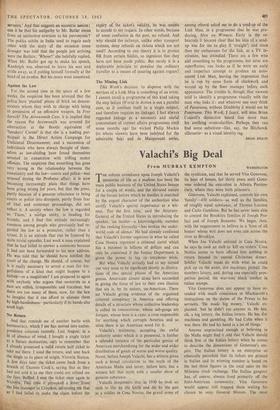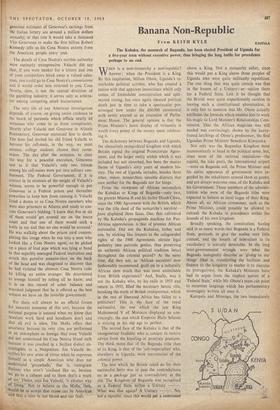Valachi's Big Deal
From MURRAY KEMPTON
WASHINGTON
THE solemn attendance upon Joseph Valachi's memories of life as a mafioso has been the main public business of the United States Senate for a couple of weeks, and the elevated nature of the forum before which he testifies is matched by tbe august character of the authorities who certify Valachi's special importance as a wit- ness. 'For the first time,' said the Attorney- General of the United States in introducing the speaker, 'an insider—a knowledgeable member. of the ranking hierarchy—has broken the under- world code of silence.' He had already confessed that Valachi's former superiors in what he called Cosa Nostra represent a criminal cartel which has a business in billions of dollars and can only be contained if the Justice Department is given the power to tap its telephone wires.
But what Valachi actually had to say turned out very soon to be significant mostly as illustra- • tions of two, special phases of the American genius. Americans almost alone have succeeded in giving the force of law to their own illusion that sin is, by its nature, un-American. There sat Valachi giving evidence of the organised criminal conspiracy in America and offering details of a structure whose collective leadership is called its commissione, whose sub-gangs are borgate, whose boss is a capo, a cosa responsible for anything which corrupts America and so alien there is no American word for it.
Valachi's testimony, accepting the awful authority under which it is presented, is further a splendid instance of the particular genius of American merchandising for the wider and wider distribution of goods of worse and worse quality. Never, before Joseph Valachi, has a witness given such a broad circulation to the myth of the American Mafia and never, before him, has a witness left that myth with a smaller show of genuine substance.
Valachi remembers that in 1930 he took an oath to live by the knife and die by the gun as a soldier in Cosa Nostra, the grand army of the syndicate, and that he served Vito Genovese, its boss of bosses, for thirty years until Geno- vese ordered his execution in Atlanta Peniten- tiary, where they were both prisoners.
Genovese, Valachi explained, controls his own 'family'-450 soldiers—as well as the families, of roughly equal substance, of Thomas Luccese and Carlo Gambino. But he has never been able to control the Brooklyn families of Joseph Pro- faci and of Joseph Bonanno. We begin, then, with the requirement to believe in a 'boss of all bosses' whose writ does not even run across the river to Brooklyn.
When Joe Valachi enlisted in Cosa Nostra, he says he took an oath to 'kill on orders.' Cosa Nostra seems to have offered him nothing in return beyond its annual Christmas dinner. Soldier Valachi made do with what he could pick up on the street, slot machines, pinball, the numbers lottery, and, during one especially pros- perous period, the war-time ,black market in ration stamps.
Vito Genovese does not appear to have at- tended with much conscience to Machiavelli's instructions on the, duties of the Prince to his servants. 'He made big money,' Valachi ex- plained, 'but he didn't cut anyone in. He has, uh, a big lottery, the Italian lottery. He has slot machines and gambling. He had Cuba when it was there. He had his hand in a lot of things.'
Anyone unpractised enough at believing in the Mafia might find it odd that Valachi should think first of the Italian lottery when he comes to describe the dimensions of Genovese's em- pire. The Italian lottery is an enterprise so ethnically parochial that its tickets are printed in Italian and its winning number is based on the last three figures in the total sales on the Milanese stock exchange. The Italian gangster has, of course, always lived primarily off the Italo-American community; Vito Genovese would appear .still trapped there waiting his chance to seize General Motors. The most generous estimates of Genovese's earnings from the Italian lottery are around a million dollars annually; at that rate it would take a thousand Vito Genoveses to make the first billion Robert Kennedy tells us his Cosa Nostra extorts from the American people every year.
The details of Cosa Nostra's terrible authority were curiously unimpressive. Valachi did say that, if you were banker for a lottery and one of your competitors hired away a valued sales- man, you could go to Cosa Nostra's commissione and it would order him returned to you. Cosa Nostra, then, is not the central direction of the gambling industry; it serves only as arbitra- tor among competing small businessmen.
The very life of any American investigation depends, of course, on giving entire credence to the touch of paranoia which afflicts nearly all witnesses who come to us from conspiracies. Shortly after Valachi met Genovese in Atlanta Penitentiary, Genovese sentenced him to death. The boss had invited his old friend Valacti to become his cell-mate, in the way, we must assume, college students choose their room- mates. The day after the sentence, to clear the way for a peaceful execution, Genovese saw to it that Valachi's only two friends among his cell-mates were put into solitary con- finement. The Federal Government, if it is correct in its estimate of the weight of Valachi's witness, seems to be powerful enough to put - Genovese in a Federal prison and thereafter powerless to keep him from running it. Valachi listed a dozen or so Cosa Nostra members who were also prisoners at Atlanta and ready to exe- cute Genovese's bidding. 'I knew that five or six of them would 'get around me on the bocce court and that one of them would stick a knife in me and that no one would be arrested.' He was walkiiig about the prison yard contem- plating this image when he ran into a man who looked like a Cosa Nostra agent, so he picked up a piece of lead pipe which was lying at hand in that superbly managed Federal institution and struck this putative assassin-elect on the back of the head and was chagrined to discover that he had violated the ultimate Cosa Nostra code by killing an entire stranger. He determined to avenge himself by telling all he knew; and it is on this record of sober balance and reasoned judgment that he is offered as the best witness we have on the invisible government.
Yet there will always be an official forum for innocent nonsense of this sort, because the national purpose is assured when we know that Senators work hard and hoodlums don't and that all evil is alien. The Mafia offers that assurance because its very rites are performed in an atmosphere so foreign that even Valachi did not understand his Cosa Nostra blood oath because it was couched in a Sicilian dialect un- intelligible to a Neapolitan. Joe Valachi de- scribes his new sense of virtue when he expresses himself as a simple American who does not understand `greaseballs,' that is, immigrant Italians who aren't 'civilised like us, because we go to a cabaret and to them that's a mark of stn.' Theirs, says Joe Valachi, 'is another way of living.' Not to believe in the Mafia, then, uould be to accept that crime can be American zinc] thus a taint in our blood and our fault.



































 Previous page
Previous page